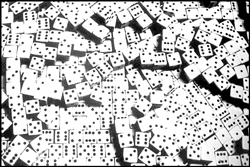 Even as the world was staring in fascination at the Euro's multicolour changes, we here in Nepal were preoccupied with the world in monochrome. After all, in the time-honoured tradition of this part of the world, money is either black or white. And, in the guise of offering us incentives to legalise it, we have just been told by the government that, unlike the Michael Jackson song, but much like the person himself, it does matter whether you and your money are black or white.
Even as the world was staring in fascination at the Euro's multicolour changes, we here in Nepal were preoccupied with the world in monochrome. After all, in the time-honoured tradition of this part of the world, money is either black or white. And, in the guise of offering us incentives to legalise it, we have just been told by the government that, unlike the Michael Jackson song, but much like the person himself, it does matter whether you and your money are black or white. This is not so much a moral judgement, but a way to swell the government's swiftly-depleting coffers. It seems to be working-a recent much-publicised effort is supposed to have brought out as much as Rs 360 million that the authorities could use. Perhaps this did happen, but then again, what government has ever admitted failure in this matter? Successive powers that be spend millions sponsoring programs on FM and in the print media, but the end result is usually much the same. But for some business groups contributing to the last-minute collections, the figures would have been positively abysmal.
The collections translate to about eighty snazzy new four-wheel drive vehicles that zip around Kathmandu roads and the 0.5 hectare of land that makes up Singha Darbar. Enough said. The whole point is that we get into quantitative targets and in the quest for numbers, we forget the rationale behind the initiative. Business people had lot to say about the technicality of the Voluntary Declaration of Income Scheme, popularly known as VDIS. They got the government to extend the scheme by providing incentives to pay later, only a couple of days before the deadline. On implementation, VDIS can be chalked up as another misstep. Political appointments in revenue management will always befuddle the best-intentioned and -planned schemes.
The very fact that the Nepali economy is so Kathmandu-centric should be leveraged so that we can prepare a more extensive database of its residents. This in itself would ensure that the tax net widens-after all, the two million in the Valley are a sizeable source of revenue, as long as the agencies make their intention and authority clear. The operations in the tax havens that are the by-lanes of the city need to be brought into the net, and then we need to urgently address a more macro-level issue, that of political funding and its legitimisation.
The public is waiting for the announcement of the much-publicised list of top evaders and the probable action that will be taken against them. The gossip at cocktail parties is that people are getting their names taken off the list by hanging about the corridors of power-after all, everything and everyone has their price here. The credibility of the government is at stake, as this time the common Nepali is really looking for some action against the people on what ought to be a hit list.
And no one but the government alone can improve its credibility. Perhaps the process should start right inside its own justifiably maligned agencies, especially those related to revenue. A clean-up there would be the strongest possible message to other evaders. The severe and unprecedented revenue problems the government is facing can be turned into an opportunity on this count. Even as expenses are soaring due to increased spending on security, routine revenues have dwindled as businesses are themselves facing mounting losses.
There cannot be a more opportune moment to act. This might be the last chance for the government to get its revenue house in order. If it misses the boat now, perhaps no one will believe in these schemes anymore.
Readers can post their views at [email protected]



